With an estimated population of about 73 million in North America alone, it is no surprise that grackles can become quite the nuisance. Hence, you must be armed with the knowledge of getting rid of them and preventing their appearance in your property.
So, how to get rid of grackles? Apply bird repellent gels or sprays, adjust your feeding schedule, remove food sources, and use a combination of visual, auditory, and physical deterrents.
If you want to know more about identifying grackles, problems they may cause, and methods you can employ to keep them away from your lawn, this article will definitely help you out!
Grackle Identification
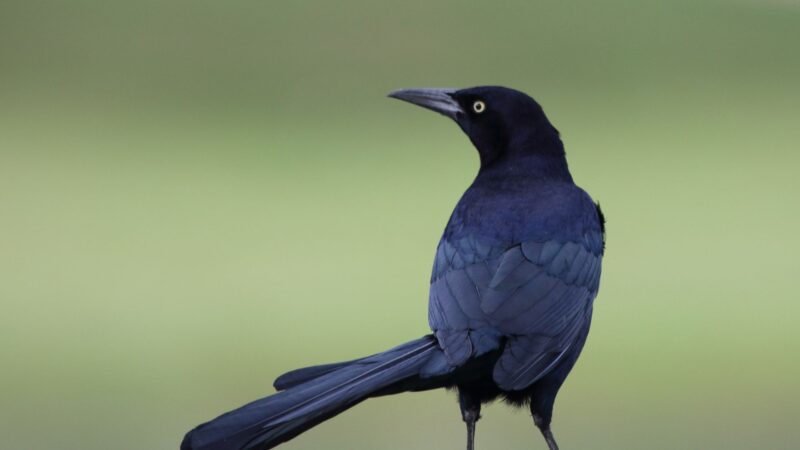
Grackles are a type of blackbirds known for their iridescent plumage, elongated tails, and distinguishable yellow eye color. Before diving into control strategies, we must first identify the different species of grackles.
Grackle Species
Of the ten existing species of grackles, there are three common types found across North America:
Common Grackle (Quiscalus Quiscula)
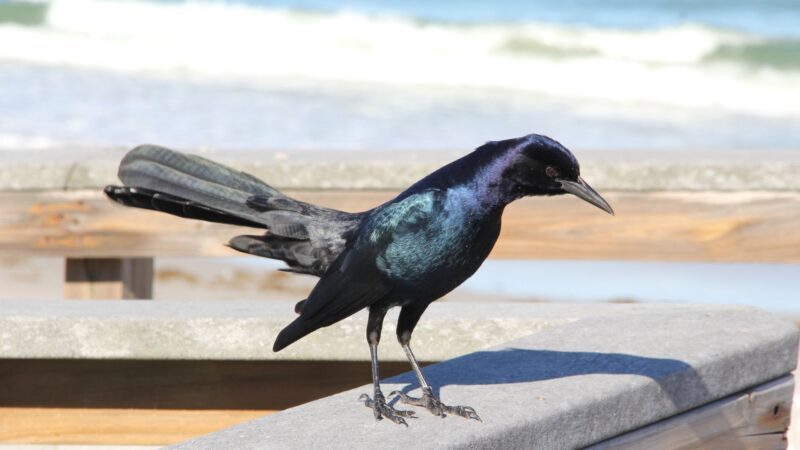
Characterized by their glossy and iridescent black overall plumage with purplish-blue or bluish-green necks, heads, and chests, Common Grackles also have long and sharp black beaks, long and keel-shaped tails, and yellow eyes.
Common grackles inhabit virtually all of eastern North America. They prefer to inhabit open areas with a scatter of trees. They are well-adapted to living in human structures such as neighborhoods, cemeteries, and city parks.
Boat-Tailed Grackle (Quiscalus Major)
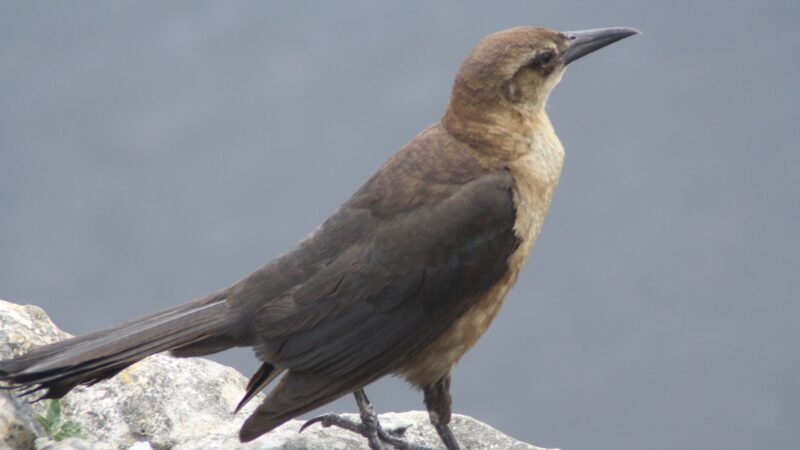
Large and lanky-bodied songbirds, Boat-tailed Grackles are glossy black with round crowns on their heads, long and pointy bills, dull brown or bright yellow eyes, long legs, and elongated tails that extend up to almost half of their entire body length.
Boat-tailed Grackles live strictly in coastal habitats, especially near saltwater, such as marshes and nearby uplands. However, they can be seen foraging in cultivated fields, city plazas and streets, and stockyards.
Great-Tailed Grackle (Quiscalus Mexicanus)
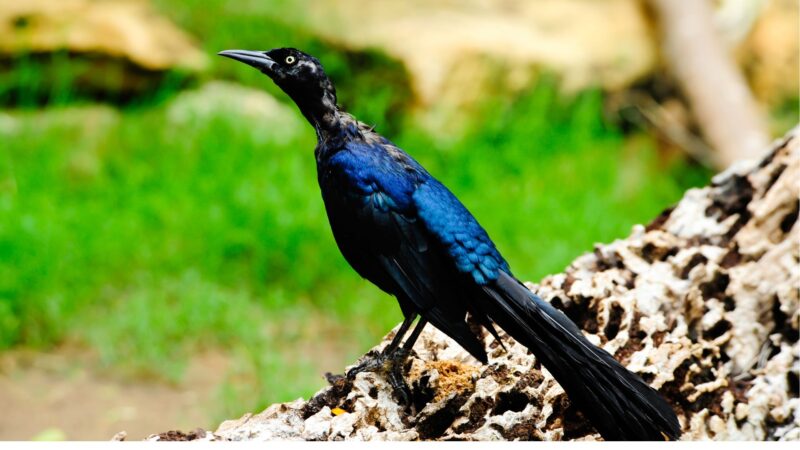
Great-tailed Grackles are slender-bodied and long-legged species with flat heads and straight beaks. Males are similar in appearance to the boat-tailed grackle but with yellow eyes and a wider, longer tail.
Their range used to be only in Southern and Central America but they have expanded in other parts of the United States. They usually reside in farms, groves, thickets, marshes, and mangroves.
Related: How to Get Rid of Northern Mockingbird? | 7 Simple Ways
Benefits of Having Grackles Around Your Yard
We must acknowledge the ecological benefits that grackles provide in controlling pest populations—not only insects but also weeds and small animals. They may be especially helpful in yards and agricultural fields. Also, they are an essential part of the food chain as they are eaten by predators.
Why Are Grackles Problematic?
Although they may be beneficial to humans and other animals, grackles are still nonetheless problematic. They may cause the following issues:
- Damage to agricultural crops and landscapes: Grackles are known to feed on fruit crops and grain, usually right before migration. This includes rice, wheat, corn, tomatoes, citrus fruits, and lettuce, resulting in crop losses of up to 25%.
- Spread diseases to livestock: These birds are carriers of bacterial pathogens such as E. coli and Salmonella which they spread either mechanically (feathers and feet) or through fecal droppings that fall into livestock feed.
- Damage to electrical structures: During winter roosting, grackles would usually perch on power lines then move to a new place in flocks. As they leave, the lines would shake wildly, hitting other lines or even structures. This may cause power outages that require costly repairs.
- Health hazard to humans: Their fecal droppings may also contain the fungus Histoplasma capsulatum, which can cause a lung infection called histoplasmosis. Additionally, they may also cause minor injuries to people and pets if they feel threatened.
- Flight hazard: Grackles can threaten aviation safety if they perform winter roosting or foraging on flight paths. In fact, according to the U.S. Federal Aviation Administration, there has been a documented 181 incidents of grackles colliding with aircrafts.
- Noise pollution: Grackles are highly social species, especially when roosting. As such, they may be especially noisy, causing disturbances in urban and suburban neighborhoods.
How to Get Rid of Grackles
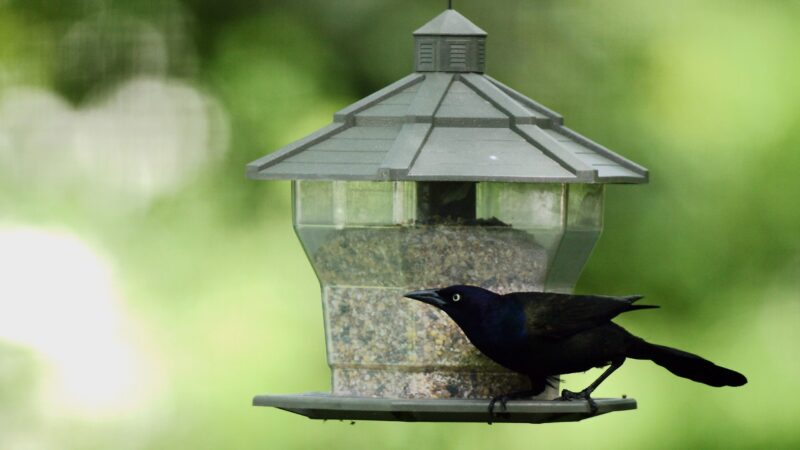
Here are some effective methods to get rid of grackles:
Apply Grackle Repellent Gel
These repellent gels are usually polybutene-based due to its sticky property that may deter grackles when they come in contact with it.
Apply Liquid Bird Repellent
You may use methyl anthranilate (grape extract based) which elicits a pain response from the birds when ingested or inhaled. It is usually sprayed onto grass or fogged towards roosting birds.
Choose the Hours You Feed
Adjust the time you choose to feed native bird species. Grackles are active throughout the day so bring out your bird feeders in the late afternoon, around 3:00 PM then bring it back inside by 8:00 PM.
Use a Motion Activated Sprinkler
Install a motion-activated water sprinkler in your property. Make sure to choose a product with greater sensitivity and wide coverage, especially if you have a large field. The disadvantage here is that you would need a water hose constantly attached to the device.
No products found.
Install a Bird Deterrent Flying Kite
Predator kites that resemble owls, hawks, and other birds of prey can be tied to a pole or suspended by a helium balloon can keep grackles away. However, you have them around to make sure the grackles don’t get used to their presence.
Related: Best Woodpecker Deterrents | Must-Read Before You Choose
Install a Fake Owl or Hawk
Purchase a fake predator or scarecrow then place it in areas where they frequently visit. To make this method even more effective, you can also place a fake dead bird near the fake model. Remember to reposition this regularly.
Install Bird Spikes on Roosting Areas
Place bird spikes on areas where grackles usually perch or roost. This includes ledges, windowsills, and other potential landing spots. Install as many spikes as necessary.
Install Grackle Proof Bird Feeders
If you already have bird feeders, consider switching to types that have smaller perches and feeding ports. Examples are tube feeders and caged feeders. These are large enough to accommodate small native birds but small enough that grackles won’t fit inside.
Remove Easily Accessible Food Sources
Properly close garbage bins and dispose of any spilled feed or pet food. Grackles mainly forage on the ground so make sure to discard any food sources that they may be attracted to.
Scare Grackles With Reflection
Distribute objects that reflect sunlight to produce a flashing effect. This includes aluminum foil, old CDs, metallic strips, and reflective tape. Place as many as necessary to provide the best results at keeping these birds away.
Related: How To Get Rid of Magpies by Scaring Them? | Tips and Guide for Keeping Them Away
Shorten or Remove Feeder Perches
If you don’t have the means to switch to new bird feeders, simply remove or shorten your bird feeder perches. This prohibits them from acquiring food from the feeder while simultaneously letting smaller native birds to feed.
Related: How to Get Rid of Blackbirds From Bird Feeder? | 8 Effective Ways to Know
Use Ultrasonic Bird Repellent
Sound devices or systems that emit either high frequency sounds or distress calls can discourage birds from entering your property. Choose a product that has a wider hearing range to reach grackles even from far distances.
No products found.
How to Keep Grackles Away Without Repelling Other Birds?
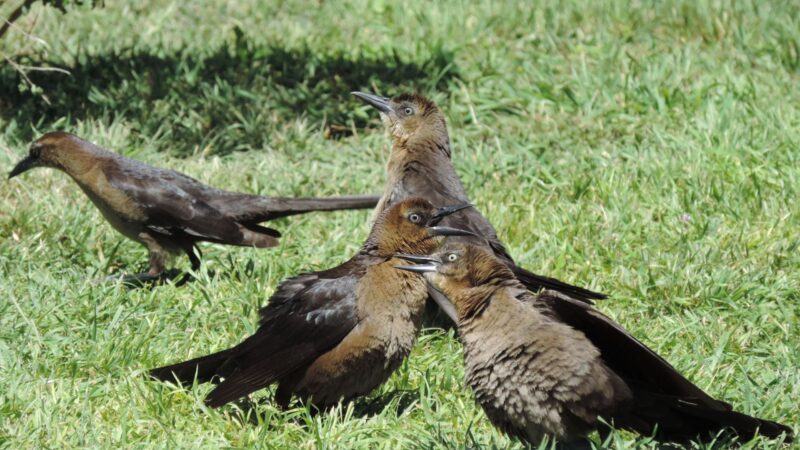
Simply make your property look less alluring to grackles. To do so, replace your feeders or reduce their perches, schedule your bird feeding accordingly, remove possible nesting sites, and employ visual, auditory, and physical deterrents.
Related: How to Prevent Birds Nesting in Roof? | Information and Control Guide
List of Sources
All About Birds. (n.d.). Boat-tailed Grackle.
All About Birds. (n.d.). Great-tailed Grackle.
Bodenchuk, M. J., & Bergman, D. L. (2020). Grackles.
Brandeis (n.d.) Common grackle Quiscalus quiscula.
Dewey, T., & Ivory, A. (n.d.) Quiscalus quiscula: common grackle.
Koby, P. (n.d.). Quiscalus mexicanus: great-tailed grackle.
- How to Get Rid of Copperheads | Practical Guide - August 27, 2023
- How to Get Rid of Corn Snakes | What Makes Them Aggressive? - August 27, 2023
- How to Get Rid of Alligators | Safety Measures and Removal Methods - July 16, 2023
